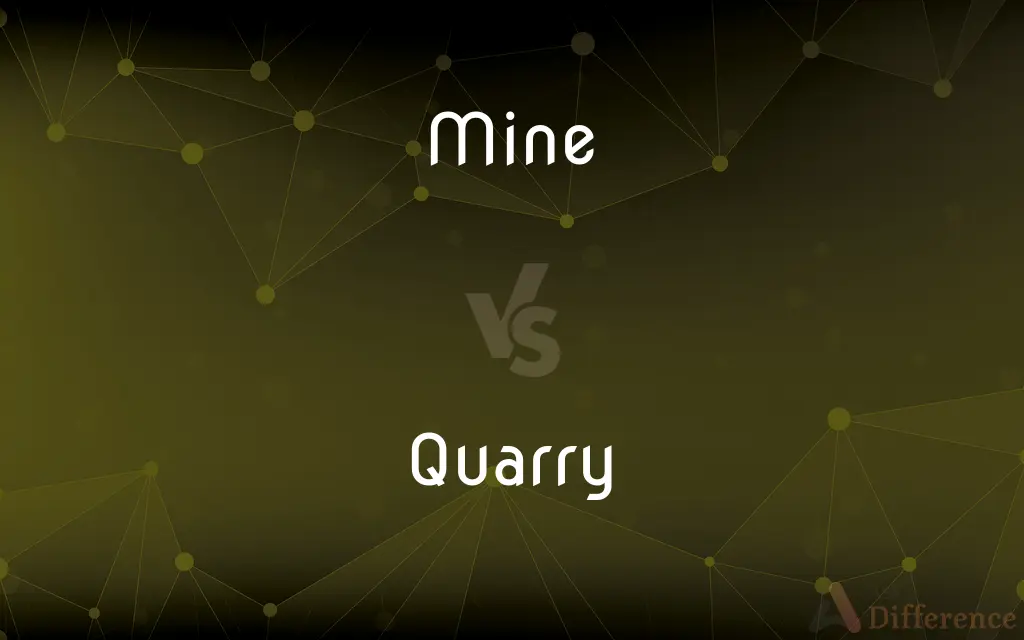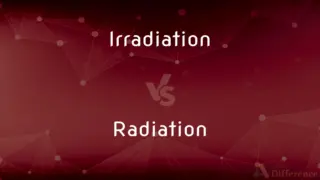Mine vs. Quarry — What's the Difference?
By Tayyaba Rehman — Updated on November 2, 2023
A mine is a type of excavation in the earth from which minerals are extracted, while a quarry is a site for extracting building materials like stone.

Difference Between Mine and Quarry
Table of Contents
ADVERTISEMENT
Key Differences
A mine refers to a complex of underground or open-pit operations where miners extract ores, precious metals, or other geological materials. Quarries, on the other hand, are surface mining operations where workers remove stone, gravel, sand, or other non-metallic materials. The term "mine" is usually associated with the extraction of substances necessary for energy production or manufacturing, while "quarry" is tied to construction materials.
Mining operations are designed based on the type of material to be extracted and can be categorized into metallic mines for metals and non-metallic mines for minerals like coal. Quarrying operations focus solely on materials used in the construction industry, such as granite or limestone, and are typically open to the atmosphere. Both mines and quarries are significant for economic development, but mines are often more capital-intensive due to deeper excavation and the complex processing of ores.
Mines often have a longer lifespan due to the extensive processes involved in extracting and processing ore, which can take decades. Quarries may have shorter operational periods; once the stone or material is depleted, the quarry is often abandoned or repurposed. The environmental impact of mines can be extensive, potentially affecting large areas and requiring rehabilitation post-closure, whereas quarries usually have a lesser impact, though still significant.
Safety protocols in mines are extremely stringent due to the risks of underground work, including cave-ins, gas exposure, and chemical hazards. Quarry workers also face safety risks like rockfalls and machinery accidents, but the open-air environment reduces some of the underground mining risks. Both types of extraction sites require specialized training for safety and efficiency, but miners often require more comprehensive education due to the complexity of their working environment.
While mines and quarries both provide resources necessary for modern living, their products serve different sectors. Mines primarily supply the mineral and energy markets, while quarries provide raw materials for infrastructure and building. Despite these differences, both are regulated by mining laws and have to follow environmental protection guidelines to mitigate their impact on the surrounding ecosystems.
ADVERTISEMENT
Comparison Chart
Environment
Usually underground; can also be open-pit
Open-air, surface mining
Materials Extracted
Ores, metals, coal, precious stones
Building stone, limestone, sand, gravel
End Use
Industrial manufacturing, energy production
Construction, architecture, landscaping
Lifespan
Can be operational for decades
Often shorter than mines; until material is depleted
Safety Risks
Underground hazards, chemical exposure
Falls, machinery accidents, less complex risks
Compare with Definitions
Mine
An excavation in the earth for extracting coal or other minerals
The coal mine supplied the region with energy.
Quarry
An animal pursued by a hunter, hound, predatory mammal, or bird of prey
The fox was the hunter’s quarry.
Mine
To lay explosive mines in (an area)
The army mined the harbor.
Quarry
A quarry is a type of open-pit mine in which dimension stone, rock, construction aggregate, riprap, sand, gravel, or slate is excavated from the ground. The operation of quarries is regulated in some jurisdictions to reduce their environmental impact.The word quarry can also include the underground quarrying for stone, such as Bath stone.
Mine
A hole or tunnel dug into the earth from which ore or minerals are extracted.
Quarry
A place where stone or slate is extracted
The ancient Romans sourced marble from this quarry.
Mine
A surface excavation where the topmost or exposed layer of earth is removed for extracting its ore or minerals.
Quarry
To extract stone or other materials from a quarry
They quarry limestone for the new building.
Mine
The site of such a hole, tunnel, or excavation, including its surface buildings and equipment.
Quarry
A hunted animal; prey.
Mine
A deposit of ore or minerals in the earth or on its surface.
Quarry
Hunted animals considered as a group; game.
Mine
An abundant supply or source of something valuable
This guidebook is a mine of information.
Quarry
An object of pursuit
The police lost their quarry in the crowd.
Mine
A tunnel dug under an enemy emplacement to destroy it by explosives, cause it to collapse, or gain access to it for an attack.
Quarry
An open excavation or pit from which stone is obtained by digging, cutting, or blasting.
Mine
An explosive device used to destroy enemy personnel, shipping, fortifications, or equipment, often placed in a concealed position and designed to be detonated by contact, proximity, or a time fuse.
Quarry
A rich or productive source
Found the book an indispensable quarry of information.
Mine
A burrow or tunnel made by an insect, especially one made in a leaf by a leaf miner.
Quarry
A square or diamond shape.
Mine
To extract (ore or minerals) from the earth.
Quarry
A pane of glass having this shape.
Mine
To dig a mine in (the earth) to obtain ore or minerals.
Quarry
To obtain (stone) from a quarry, as by cutting, digging, or blasting.
Mine
To tunnel under (the earth or a surface feature).
Quarry
To extract (facts, for example) by long, careful searching
Finally quarried out the genealogy from hundreds of sources.
Mine
To make (a tunnel) by digging.
Quarry
To use (land) as a quarry.
Mine
To lay explosive mines in or under.
Quarry
(mining) A site for mining stone, limestone, or slate.
Mine
To attack, damage, or destroy by underhand means; subvert.
Quarry
A part of the entrails of a hunted animal, given to the hounds as a reward.
Mine
To delve into and make use of; exploit
Mine the archives for detailed information.
Quarry
(uncountable) An animal, often a bird or mammal, which is hunted.
Mine
To excavate the earth for the purpose of extracting ore or minerals.
Quarry
(countable) An object of search or pursuit.
Mine
To work in a mine.
Quarry
A diamond-shaped tile or pane, often of glass or stone.
Mine
To dig a tunnel under the earth, especially under an enemy emplacement or fortification.
Quarry
(transitive) To obtain (or mine) stone by extraction from a quarry.
Mine
To lay explosive mines.
Quarry
To extract or slowly obtain by long, tedious searching.
They quarried out new, interesting facts about ancient Egypt from old papyri.
Mine
Used instead of my before an initial vowel or the letter h.
Quarry
To secure prey; to prey, as a vulture or harpy.
Mine
That which belongs to me.
Quarry
Same as 1st Quarrel.
Mine
Used predicatively.
The house itself is mine, but the land is not.
Quarry
A part of the entrails of the beast taken, given to the hounds.
Mine
Used substantively, with an implied noun.
Mine has been a long journey.
Quarry
The object of the chase; the animal hunted for; game; especially, the game hunted with hawks.
The wily quarry shunned the shock.
Mine
Used absolutely, set off from the sentence.
Mine for only a week so far, it already feels like an old friend.
Quarry
A place, cavern, or pit where stone is taken from the rock or ledge, or dug from the earth, for building or other purposes; a stone pit. See 5th Mine (a).
Mine
Used otherwise not directly before the possessed noun. en
Quarry
Quadrate; square.
Mine
My; belonging to me.
Quarry
To secure prey; to prey, as a vulture or harpy.
Mine
(archaic) Used attributively after the noun it modifies.
Quarry
To dig or take from a quarry; as, to quarry marble.
Mine
(archaic) Used attributively before a vowel.
Quarry
A person who is the aim of an attack (especially a victim of ridicule or exploitation) by some hostile person or influence;
He fell prey to muggers
Everyone was fair game
The target of a manhunt
Mine
An excavation from which ore or solid minerals are taken, especially one consisting of underground tunnels.
This diamond comes from a mine in South Africa.
He came out of the coal mine with a face covered in black.
Most coal and ore comes from open-pit mines nowadays.
Quarry
A surface excavation for extracting stone or slate;
A British term for `quarry' is `stone pit'
Mine
(figurative) Any source of wealth or resources.
She's a mine of information.
Quarry
Animal hunted or caught for food
Mine
(military) A passage dug toward or underneath enemy lines, which is then packed with explosives.
Quarry
Extract (something such as stones) from or as if from a quarry;
Quarry marble
Mine
(military) A device intended to explode when stepped upon or touched, or when approached by a ship, vehicle, or person.
His left leg was blown off after he stepped on a mine.
The warship was destroyed by floating mines.
Quarry
To cut into rock or ground to obtain stone or other materials
The masons quarried into the hillside for blocks of stone.
Mine
(pyrotechnics) A type of firework that explodes on the ground, shooting sparks upward.
Quarry
A diamond-shaped pane of glass as used in lattice windows
The quarry tiles added character to the estate’s aesthetic.
Mine
(entomology) The cavity made by a caterpillar while feeding inside a leaf.
Mine
(computing) A machine or network of machines used to extract units of a cryptocurrency.
Mine
Alternative form of mien
Mine
(ambitransitive) To remove (rock or ore) from the ground.
Mine
To dig into, for ore or metal.
Mine
(transitive) To sow mines (the explosive devices) in (an area).
We had to slow our advance after the enemy mined the road ahead of us.
Mine
(transitive) To damage (a vehicle or ship) with a mine (an explosive device).
Mine
(intransitive) To dig a tunnel or hole; to burrow in the earth.
The mining cony
Mine
To dig away, or otherwise remove, the substratum or foundation of; to lay a mine under; to sap; to undermine.
Mine
To ruin or destroy by slow degrees or secret means.
Mine
(slang) To pick one's nose.
Mine
(cryptocurrencies) To earn new units of cryptocurrency by doing certain calculations.
Mine
See Mien.
Mine
A subterranean cavity or passage
Mine
Any place where ore, metals, or precious stones are got by digging or washing the soil; as, a placer mine.
Mine
A rich source of wealth or other good.
Mine
An explosive device placed concealed in a location, on land or at sea, where an enemy vehicle or enemy personnel may pass through, having a triggering mechanism which detects people or vehicles, and which will explode and kill or maim personnel or destroy or damage vehicles. A mine placed at sea (formerly called a torpedo, see torpedo{2} (a)) is also called an marine mine and underwater mine and sometimes called a floating mine, even though it may be anchored to the floor of the sea and not actually float freely. A mine placed on land (formerly called a torpedo, see torpedo{3}), usually buried, is called a land mine.
Mine
Belonging to me; my. Used as a pronominal to me; my. Used as a pronominal adjective in the predicate; as, "Vengeance is mine; I will repay." Rom. xii. 19. Also, in the old style, used attributively, instead of my, before a noun beginning with a vowel.
I kept myself from mine iniquity.
When a man deceives me once, says the Italian proverb, it is his fault; when twice, it is mine.
This title honors me and mine.
She shall have me and mine.
Mine
To dig a mine or pit in the earth; to get ore, metals, coal, or precious stones, out of the earth; to dig in the earth for minerals; to dig a passage or cavity under anything in order to overthrow it by explosives or otherwise.
Mine
To form subterraneous tunnel or hole; to form a burrow or lodge in the earth; as, the mining cony.
Mine
To dig away, or otherwise remove, the substratum or foundation of; to lay a mine under; to sap; to undermine; hence, to ruin or destroy by slow degrees or secret means.
They mined the walls.
Too lazy to cut down these immense trees, the spoilers . . . had mined them, and placed a quantity of gunpowder in the cavity.
Mine
To dig into, for ore or metal.
Lead veins have been traced . . . but they have not been mined.
Mine
To get, as metals, out of the earth by digging.
The principal ore mined there is the bituminous cinnabar.
Mine
Excavation in the earth from which ores and minerals are extracted
Mine
Explosive device that explodes on contact; designed to destroy vehicles or ships or to kill or maim personnel
Mine
Get from the earth by excavation;
Mine ores and metals
Mine
Lay mines;
The Vietnamese mined Cambodia
Mine
To dig in the earth for extracting minerals
They mine for gold in these hills.
Mine
Used to refer to a thing or things belonging to or associated with the speaker
That book is mine.
Mine
An explosive device placed in the ground
The field had been sown with mines.
Common Curiosities
What materials are commonly extracted from a quarry?
Quarries are typically used to extract building materials, such as stone, limestone, sand, and gravel.
Can a mine be both above and below ground?
Yes, mines can be open-pit (above ground) or underground operations depending on the material being extracted.
Are the environmental impacts of mines and quarries different?
Yes, mines can have more extensive environmental impacts, including soil and water contamination, whereas quarries generally have a lesser but still significant impact.
How do the lifespans of mines and quarries compare?
Mines often have longer lifespans than quarries because the extraction and processing of ores is more complex and time-consuming.
Is 'mine' ever used in a non-extraction context?
Yes, 'mine' is also a possessive pronoun and can refer to an explosive device used in military contexts.
Is 'quarry' used in any context other than extraction?
Yes, 'quarry' can refer to the prey pursued in hunting or a diamond-shaped pane of glass.
What is the difference in the regulatory oversight for mines and quarries?
Both mines and quarries are subject to mining laws, but mines typically face stricter regulation due to their environmental and safety impact.
Do quarry workers face any safety risks?
Yes, quarry workers are at risk from rockfalls, machinery accidents, and other occupational hazards.
What is the primary purpose of a mine?
A mine is primarily used to extract minerals, metals, and other geological materials from beneath the earth's surface.
What type of safety risks are associated with mines?
Mines pose risks of cave-ins, gas exposure, and chemical hazards, particularly in underground operations.
Do the terms 'mine' and 'quarry' have any historical significance?
Yes, both terms have historical roots with mines being ancient sources of metals and quarries being the source of stone for building throughout history.
Can quarries become filled with water?
Yes, after a quarry is abandoned, it can collect water and become a quarry lake.
Can the term 'mine' refer to a verb?
Yes, 'mine' can be a verb meaning to excavate materials from the earth.
Are mines and quarries exclusive to certain materials?
Yes, mines are associated with extracting ores and minerals, while quarries typically focus on construction materials.
Can 'quarry' also be a verb, and if so, what does it mean?
Yes, as a verb, 'quarry' means to extract stone or other materials from a quarry.
Share Your Discovery

Previous Comparison
Rectangular vs. Oblong
Next Comparison
Irradiation vs. RadiationAuthor Spotlight
Written by
Tayyaba RehmanTayyaba Rehman is a distinguished writer, currently serving as a primary contributor to askdifference.com. As a researcher in semantics and etymology, Tayyaba's passion for the complexity of languages and their distinctions has found a perfect home on the platform. Tayyaba delves into the intricacies of language, distinguishing between commonly confused words and phrases, thereby providing clarity for readers worldwide.













































